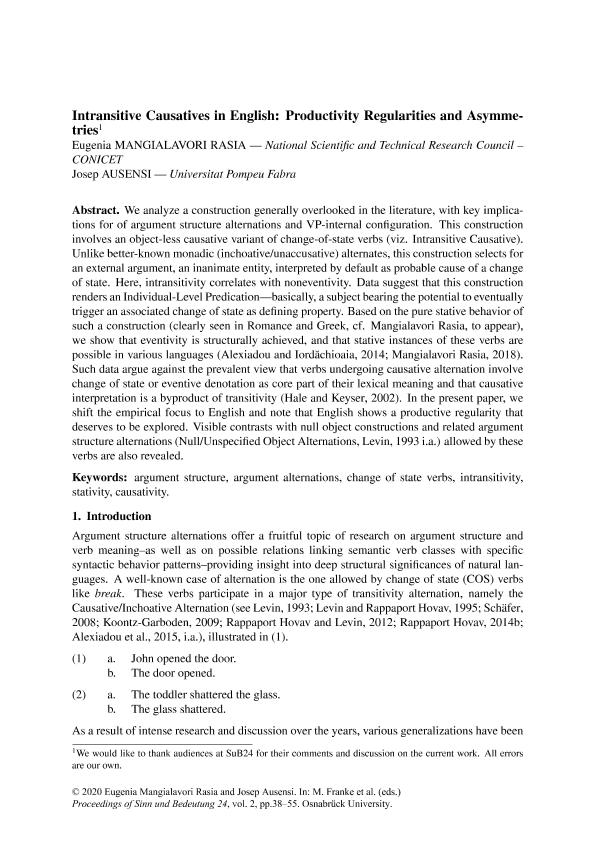Mostrar el registro sencillo del ítem
dc.contributor.author
Mangialavori Rasia, Maria Eugenia

dc.contributor.author
Ausensi, Josep
dc.date.available
2022-05-12T03:43:25Z
dc.date.issued
2020-09-17
dc.identifier.citation
Mangialavori Rasia, Maria Eugenia; Ausensi, Josep; Intransitive Causatives in English: productivity regularities and asymmetries; University of Konstanz; Proceedings of Sinn un Bedeutung; 24; 2; 17-9-2020; 38-55
dc.identifier.issn
2629-6055
dc.identifier.uri
http://hdl.handle.net/11336/157299
dc.description.abstract
We analyze a construction generally overlooked in the literature, with key implications for of argument structure alternations and VP-internal configuration. This construction involves an object-less causative variant of change-of-state verbs (viz. Intransitive Causative). Unlike better-known monadic (inchoative/unaccusative) alternates, this construction selects for an external argument, an inanimate entity, interpreted by default as probable cause of a change of state. Here, intransitivity correlates with noneventivity. Data suggest that this construction renders an Individual-Level Predication—basically, a subject bearing the potential to eventually trigger an associated change of state as defining property. Based on the pure stative behavior of such a construction (clearly seen in Romance and Greek, cf. Mangialavori Rasia, to appear), we show that eventivity is structurally achieved, and that stative instances of these verbs are possible in various languages (Alexiadou and Iordachioaia, 2014; Mangialavori Rasia, 2018). ˘ Such data argue against the prevalent view that verbs undergoing causative alternation involve change of state or eventive denotation as core part of their lexical meaning and that causative interpretation is a byproduct of transitivity (Hale and Keyser, 2002). In the present paper, we shift the empirical focus to English and note that English shows a productive regularity that deserves to be explored. Visible contrasts with null object constructions and related argument structure alternations (Null/Unspecified Object Alternations, Levin, 1993 i.a.) allowed by these verbs are also revealed.
dc.format
application/pdf
dc.language.iso
eng
dc.publisher
University of Konstanz
dc.rights
info:eu-repo/semantics/openAccess
dc.rights.uri
https://creativecommons.org/licenses/by/2.5/ar/
dc.subject
ARGUMENT STRUCTURE ALTERNATION
dc.subject
INTRANSITIVITY
dc.subject
PSYCH VERBS
dc.subject
STATIVITY
dc.subject
CAUSATIVITY
dc.subject.classification
Lingüística

dc.subject.classification
Lengua y Literatura

dc.subject.classification
HUMANIDADES

dc.title
Intransitive Causatives in English: productivity regularities and asymmetries
dc.type
info:eu-repo/semantics/article
dc.type
info:ar-repo/semantics/artículo
dc.type
info:eu-repo/semantics/publishedVersion
dc.date.updated
2022-05-02T17:05:07Z
dc.identifier.eissn
2629-6055
dc.journal.volume
24
dc.journal.number
2
dc.journal.pagination
38-55
dc.journal.pais
Alemania

dc.journal.ciudad
Berlin
dc.description.fil
Fil: Mangialavori Rasia, Maria Eugenia. Universidad Nacional de Rosario. Facultad de Humanidades y Artes; Argentina. Consejo Nacional de Investigaciones Científicas y Técnicas. Centro Científico Tecnológico Conicet - Rosario; Argentina
dc.description.fil
Fil: Ausensi, Josep. Universitat Pompeu Fabra; España
dc.journal.title
Proceedings of Sinn un Bedeutung
dc.relation.alternativeid
info:eu-repo/semantics/altIdentifier/url/https://ojs.ub.uni-konstanz.de/sub/index.php/sub/article/view/885
dc.relation.alternativeid
info:eu-repo/semantics/altIdentifier/doi/https://doi.org/10.18148/sub/2020.v24i2.885
Archivos asociados
